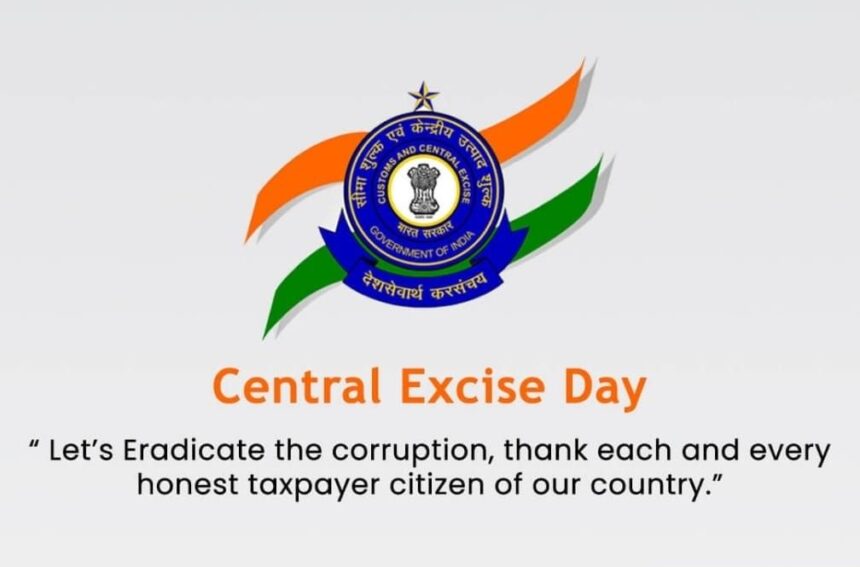🏛️ Introduction: Honoring the Invisible Backbone of the Nation
While soldiers guard our borders, a lesser-known yet equally crucial force safeguards the economic sovereignty of the nation — the Central Board of Indirect Taxes and Customs (CBIC), formerly known as Central Excise and Customs.
- 🗓️ Timeline: The Evolution of Central Excise in India
- 📜 History of Central Excise Day
- 💡 7 Powerful Facts About Central Excise
- 📌 Importance of Central Excise in Our Life
- 🏘️ 1. Keeps Government Running
- 🛒 2. Ensures Fair Market Prices
- 🚫 3. Regulates Harmful Products
- 📊 4. Drives Transparency in Business
- ⚖️ 5. Promotes Social Equity
- ❓ Frequently Asked Questions (FAQs)
- 📆 Why is Central Excise Day celebrated on February 24?
- 👨✈️ Who observes this day?
- 💼 How has GST affected Central Excise?
- 🌍 Is it a public holiday?
- 🎉 How Is Central Excise Day Observed?
- 💬 Inspirational Wishes and Messages
- 🧠 Why Central Excise Still Matters in the GST Era
- 🌟 Key Takeaways
- 🏁 Conclusion: Honoring the Guardians of Economic Discipline
Central Excise Day, celebrated every year on February 24, recognizes the tireless efforts of excise officers who play a pivotal role in the collection of indirect taxes and the regulation of goods and services. This day highlights the commitment, discipline, and integrity of these professionals who ensure that the economic engine of India runs efficiently.
🗓️ Timeline: The Evolution of Central Excise in India
| Year | Event |
|---|---|
| 1944 | Central Excise and Salt Act passed — laid the foundation of India’s excise system. |
| 1963 | Establishment of the Customs and Central Excise Board under the Department of Revenue. |
| 1975 | Introduction of MODVAT, a precursor to today’s GST input credit system. |
| 1985 | Formation of the CBEC (Central Board of Excise and Customs). |
| 2003 | First celebration of Central Excise Day on February 24. |
| 2017 | Goods and Services Tax (GST) implemented, reducing the role of Central Excise to limited goods like petroleum, tobacco, etc. |
| 2018 | CBEC renamed as CBIC (Central Board of Indirect Taxes and Customs). |
📜 History of Central Excise Day
Central Excise Day is celebrated annually on February 24 to commemorate the enactment of the Central Excise and Salt Act, 1944, which became the foundation of the modern taxation system in India.
Excise duties, though indirect, have historically been a major source of revenue for the Indian government. This day was established not only to appreciate the role of excise officers but also to create awareness among businesses and citizens about compliance, transparency, and national duty.
It acknowledges the unsung heroes of our economy — the officers, inspectors, and officials who work behind the scenes to enforce tax laws and combat evasion.
💡 7 Powerful Facts About Central Excise
💰 Excise duty is levied on the manufacture or production of goods within India (unlike customs, which is on imports/exports).
🏭 It mainly applies to tobacco products, petroleum, and alcohol, even post-GST implementation.
🧾 Excise duty is an indirect tax, meaning it is passed on to the consumer but collected from the manufacturer.
🛡️ Excise officers also prevent illicit trade, tax evasion, and ensure adherence to environmental standards.
🏛️ The CBIC is under the Ministry of Finance, Department of Revenue and governs all indirect taxation matters in India.
🎖️ Excise personnel often work in remote industrial areas, border regions, and risky environments.
📦 Before GST, excise duty, service tax, and VAT were the main pillars of India’s indirect tax system.
📌 Importance of Central Excise in Our Life
Although most people may never see or speak with an excise officer, their work affects us every single day:
🏘️ 1. Keeps Government Running
Excise duty contributes significantly to national revenue, helping fund schools, hospitals, infrastructure, and social schemes.
🛒 2. Ensures Fair Market Prices
Excise policies help prevent illegal manufacturing and hoarding, ensuring stable and fair product pricing.
🚫 3. Regulates Harmful Products
Excise duty is strategically high on harmful goods like tobacco and alcohol to discourage consumption.
📊 4. Drives Transparency in Business
With efficient tax systems in place, businesses operate more ethically, strengthening the economy.
⚖️ 5. Promotes Social Equity
By taxing luxury items more heavily, excise systems help in redistributing wealth, making society more equitable.
❓ Frequently Asked Questions (FAQs)
📆 Why is Central Excise Day celebrated on February 24?
It marks the anniversary of the Central Excise and Salt Act, 1944, the legislation that empowered the Indian government to collect excise duty.
👨✈️ Who observes this day?
Excise and CBIC officials, government employees, taxation experts, and industries involved in manufacturing and compliance participate in observances and seminars.
💼 How has GST affected Central Excise?
GST absorbed most indirect taxes. However, Central Excise is still levied on certain products like fuel, alcohol, and tobacco, and thus remains important.
🌍 Is it a public holiday?
No, Central Excise Day is not a public holiday but is observed formally within government departments and industry circles.
🎉 How Is Central Excise Day Observed?
🧑⚖️ Government Programs
Seminars and awareness sessions on tax compliance.
Awards and recognition ceremonies for outstanding officers.
Workshops for industry stakeholders.
🏭 Industry Collaboration
CSR activities in manufacturing hubs.
Collaboration with excise officers for awareness and transparency.
Taxpayer felicitation programs to honor compliant businesses.
📢 Public Engagement
Social media campaigns using hashtags like #ExciseDayIndia #TaxHeroes.
Educational drives in colleges on career opportunities in the Indian Revenue Service.
Release of commemorative stamps or infographics by CBIC.
💬 Inspirational Wishes and Messages
🇮🇳 “Saluting the brave men and women who make our economy stronger, one duty at a time. Happy Central Excise Day!”
💼 “Excise is more than a tax. It’s a trust — for transparency, responsibility, and national growth.”
📈 “To all tax officers who work silently for our nation’s progress — your service is truly invaluable.”
🛡️ “Let’s honor those who protect our economy with integrity and discipline.”
🧠 Why Central Excise Still Matters in the GST Era
Although the Goods and Services Tax (GST) revolutionized India’s taxation system, Central Excise Duty continues to be relevant:
GST does not apply to petroleum and alcohol, so excise collection is still crucial.
Excise officers are involved in customs, anti-smuggling, and narcotics control.
The legacy experience of excise personnel is vital in navigating tax transitions and fraud control.
🌟 Key Takeaways
Central Excise Day is celebrated on February 24 every year.
It commemorates the implementation of the Central Excise and Salt Act of 1944.
Excise plays a major role in nation-building, economic fairness, and law enforcement.
Excise officers are the unsung heroes ensuring tax compliance and industrial integrity.
Despite GST, excise duty continues to fund essential government services.
🏁 Conclusion: Honoring the Guardians of Economic Discipline
While their work might not make headlines, excise officers are the guardians of economic accountability. Central Excise Day reminds us of their silent but significant role in maintaining the financial health of the nation.
In an era of evolving tax systems and digital reforms, their adaptability, dedication, and values remain a beacon of discipline and transparency.
Let’s celebrate and support these officers — for their service, strength, and sacrifice — not just on February 24, but every day.








